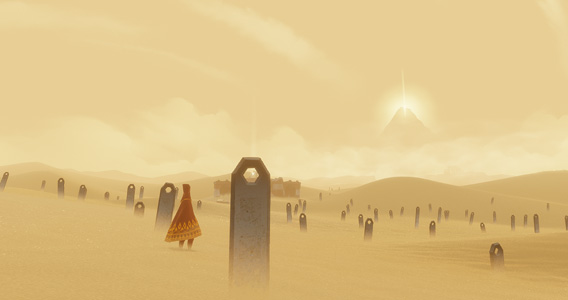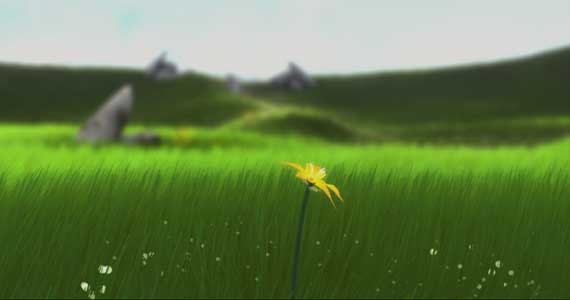
Reviewing Journey would be a bit like watching the sun set over the water while holding a lover’s hand, and then breaking the silence of that precious moment with a number from 1-10. I understand that it’s some people’s jobs to stick a number to everything, and I sympathize, even if the act suggests knowing something about the price of everything and the value of nothing.
But don’t take that to mean that I’m in a hurry to help rekindle the games as art you hang on the wall angle either.
Journey is simply an experience, and one that I wouldn’t have been able to understand had someone tried to explain it to me beforehand, which someone did. Chris Lepine was going to write about the game here, and has since crafted some fine words you can catch up with here, but the moment I read them I knew that this was a Journey I would have to make on my own in order to discover some sliver of understanding.
Since my desire to have the longest scarf possible seems rather vain however, I’m still left wanting for words to begin describing what I found.
I can tell you about sinking heavy footsteps into glistening sands, or floating ever higher to ascend a tower, or even sliding down hills while the camera bends to let the light of the sun break through ancient ruins.
I can tell you lots of things, but I can’t convince you of the feelings such a journey inspired within me.
Maybe I should tell you that I met eight different people along that journey. I know this because the game has told me so, and I can only take that on faith since every encounter with another person provides the same anonymous companion that shares my own likeness. Perhaps one companion is less eager to chirp back with the musical notes of expression I continually sought to communicate some primitive intentions with. Perhaps one companion remains close at hand rather than rushing off toward the mountain in the distance. The only time the difference of your companion stresses itself is when they rush off beyond your line of sight with little regard for your company, and even then I can’t help feeling happy to find them again.
The nameless stranger that lingers on my mind is the one that crossed the icy mountain path with me, taking shelter behind stone markers as strong winds threatened to thwart our advance, and huddling in the shadows while large beasts flew overhead. As we overcame these obstacles, the path forward began to vanish in the rising winds, and my feet became heavier with each step forward through the thickening snow.
What kept me pushing forward on the analog stick was my companion, slightly ahead and providing a beacon, a reason to continue pushing against the blinding storm.
I had imagined that Journey’s limitations on communication would leave me saying that the game is about the most earnest connection two people can share, that it cuts away all the things we think we know about each other.
But Journey cuts deeper than that, to the raw source of motivation and hope we find in others, to the fact that our existence on its own is not enough to necessitate that we continue for our own sake. Certainly we live for ourselves to project strength and obey the demands of our DNA, but beneath that skin, we always hope for others to connect and share the journey with, strangers that we’ll never really know, but who when you strip external constructions away, are perhaps exactly the same as us.
